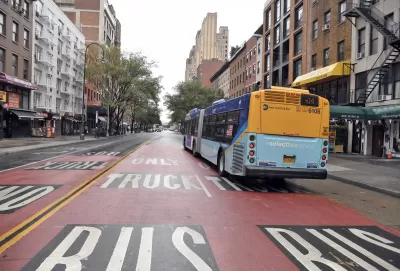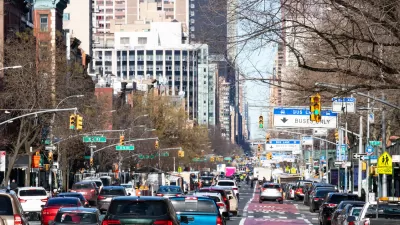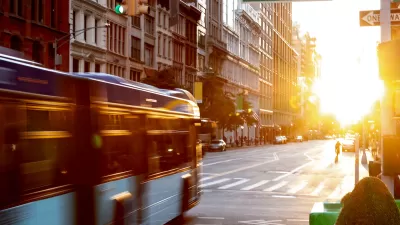New York City’s Metropolitan Transportation Authority is renewing efforts to create more bus lanes and dedicated busways in the city.

“In January 2021, the busiest portion of Flushing’s Main Street became a ‘busway,’ meaning only buses, trucks and emergency vehicles are allowed past a certain point,” writes John Surico for Bloomberg CityLab. “Within months, the city reported speed gains of up to 31%. As of May, it’s up 50% at the afternoon peak, according to a city Department of Transportation spokesperson.”
As Surico describes, “The busway treatment was part of Better Buses Restart, the reactivation of New York City’s service improvement plan from 2018, which screeched to a halt in March 2020.” Prior to the plan, “The five-borough network hadn’t been touched in decades, leaving the system out of sync with where New Yorkers were actually going; work and living patterns have shifted dramatically, a process that the pandemic accelerated further.”
However, “Like the subway, New York’s buses are trapped in a jurisdictional battle: the (state) MTA controls the routes and fleet, but the (city) DOT is in charge of the streets. Knowing who controls what can be tricky. And collaboration can leave much to be desired: The MTA called for 60 miles of new bus lanes, but so far the city has only delivered about 20 miles.” Last August, DOT and MTA pledged to build or improve 20 new miles of bus lanes or busways in 2022. “DOT officials said the major focus this year will be the Bronx, given the redesign launch in June. They are also rolling out bus priority projects in Manhattan and Queens, and more busways are in development.”
Advocates warn that “Finding a way to keep cars out of bus- and truck-only corridors is critical to making them work,” and the MTA is investing in automated traffic enforcement to crack down on drivers who illegally enter bus lanes.
Last year, the agency also introduced a contactless payment system that streamlines onboarding and reduces the time buses are stopped as passengers board, although the program’s all-door boarding component has not yet been put into action.
“In interviews, advocates seem both motivated and anxious by the progress that the system has made, and the scale of the work still left to do.” While the system is still well below pre-pandemic ridership revenue, the MTA expects to receive millions once the city launches its congestion pricing program.
FULL STORY: How New York City Plans to Speed Up its Buses

Planetizen Federal Action Tracker
A weekly monitor of how Trump’s orders and actions are impacting planners and planning in America.

Chicago’s Ghost Rails
Just beneath the surface of the modern city lie the remnants of its expansive early 20th-century streetcar system.

San Antonio and Austin are Fusing Into one Massive Megaregion
The region spanning the two central Texas cities is growing fast, posing challenges for local infrastructure and water supplies.

Since Zion's Shuttles Went Electric “The Smog is Gone”
Visitors to Zion National Park can enjoy the canyon via the nation’s first fully electric park shuttle system.

Trump Distributing DOT Safety Funds at 1/10 Rate of Biden
Funds for Safe Streets and other transportation safety and equity programs are being held up by administrative reviews and conflicts with the Trump administration’s priorities.

German Cities Subsidize Taxis for Women Amid Wave of Violence
Free or low-cost taxi rides can help women navigate cities more safely, but critics say the programs don't address the root causes of violence against women.
Urban Design for Planners 1: Software Tools
This six-course series explores essential urban design concepts using open source software and equips planners with the tools they need to participate fully in the urban design process.
Planning for Universal Design
Learn the tools for implementing Universal Design in planning regulations.
planning NEXT
Appalachian Highlands Housing Partners
Mpact (founded as Rail~Volution)
City of Camden Redevelopment Agency
City of Astoria
City of Portland
City of Laramie





























